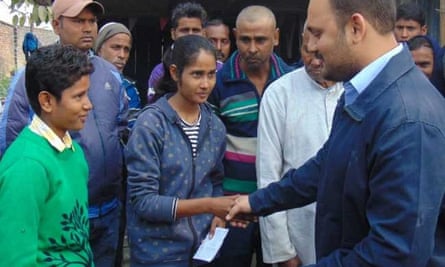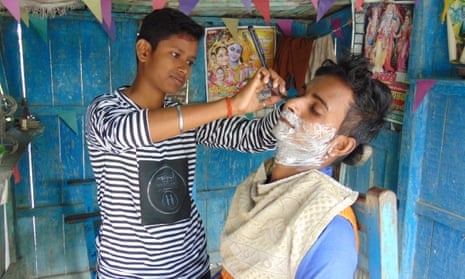Two teenage girls have been honoured by the Indian government after it was discovered they had pretended to be boys for four years to run their father’s barbershop when he became too ill to work.
Jyoti Kumari, 18, and her 16-year-old sister, Neha, took over their father’s salon in their rural Uttar Pradesh state village after he became ill in 2014. The barbershop had initially closed but was the family’s only source of income, compelling the girls to try to run it themselves.
Customers were initially sceptical about having their hair or moustaches trimmed by young women, while others “did not behave well towards us”, Jyoti told the Guardian. “So we decided to change our whole get-up so that none could identify us.”
The girls cut their hair short, donned the stainless steel bracelets worn by men and adopted the male names Deepak and Raju. Several of those in their village of about 100 houses knew their real identities, but for the next few years, most customers from surrounding communities had no idea, Neha said. “You could not identify me even today.”

The pair earned at least 400 rupees per day from the business, enough to pay for their father’s treatment and support the family. “We faced a lot of troubles when we started the job in 2014,” Neha said. “Others in the village mocked us but we ignored them and focused on work, since we had no other option.”
The girls would open the shop in the afternoon so they could continue attending school. Jyoti has now graduated and Neha is still studying.
As the years have passed, they have slowly revealed their real identities to more customers. “Now we have gained enough confidence and don’t fear anyone,” Neha said. “The majority of people have come to know that we are girls.” Jyoti has started regrowing her hair.
After a journalist from the nearby city Gorakhpur published a story about the girls in a Hindi newspaper this week, they were honoured by government officers.
“They are the brilliant story of how one can survive battling all odds,” said Abhishek Pandey, an official. “The little sisters are the inspiration for society and their story must be told to the masses.”
Dhruv Narayan, the girls’ father, said: “This gives me a lot of pain when I find them at work but I am very proud of my daughters. They have extricated the family out of sudden crisis.”
The girls said they would continue to run the barber shop in Banwari Tola village, which has become well-known since their story was published in local newspapers. They said their customers were unconcerned by the revelation of their true identities and most were touched by the noble purpose of the ruse.
Most women in rural India work either on farms or from their homes at the end of large supply chains, embroidering or stitching clothes or preparing and packaging food.
They usually work segregated from men. Running a male salon, especially in conservative rural parts of north and eastern India is unheard of.
Labour force participation among Indian women has fallen over the past two decades even as the country’s economy has substantially grown.
Analysts attributed the fall to women paying a professional “marriage penalty”, with many continuing to drop out of the workforce when they wed, either because their husband’s or family demand it or because of the strain of needing to carry the burden of running a household alongside their jobs.
